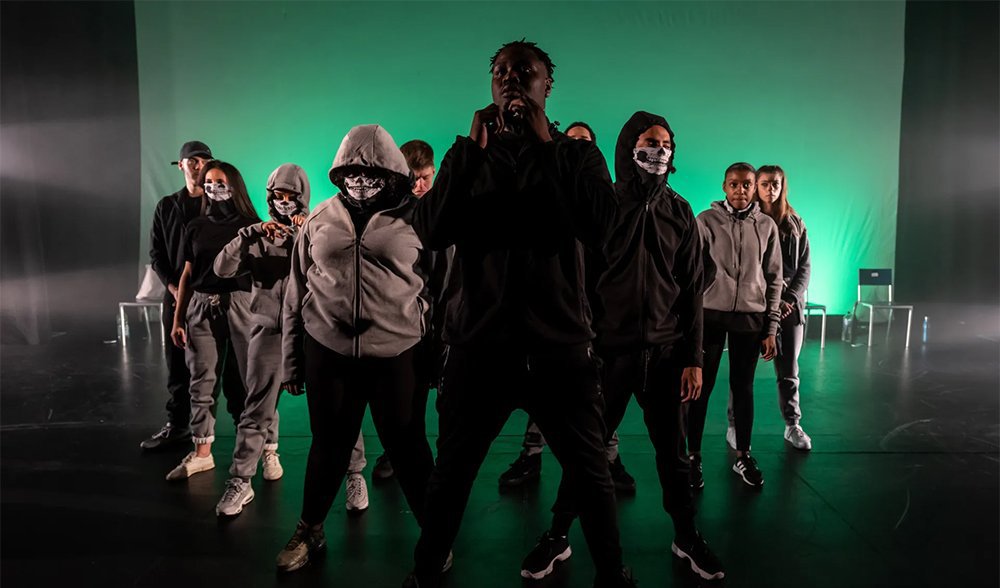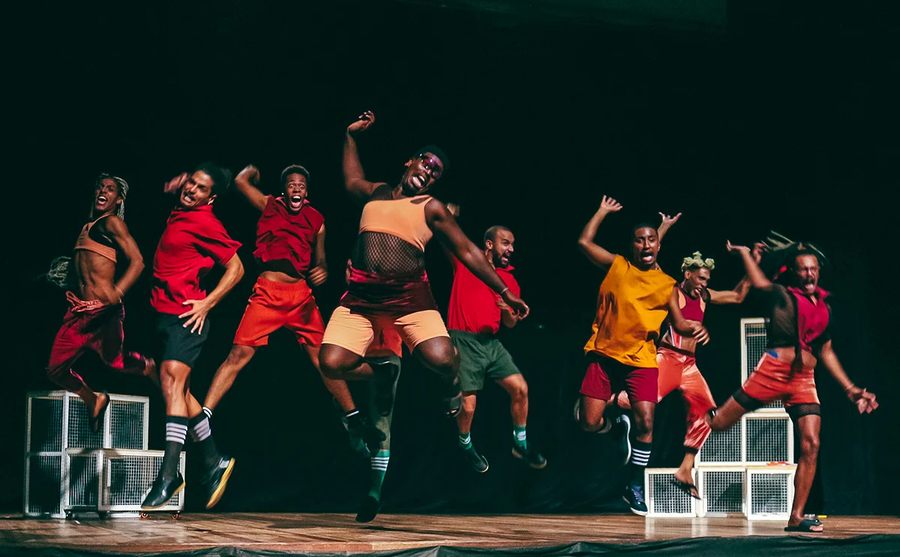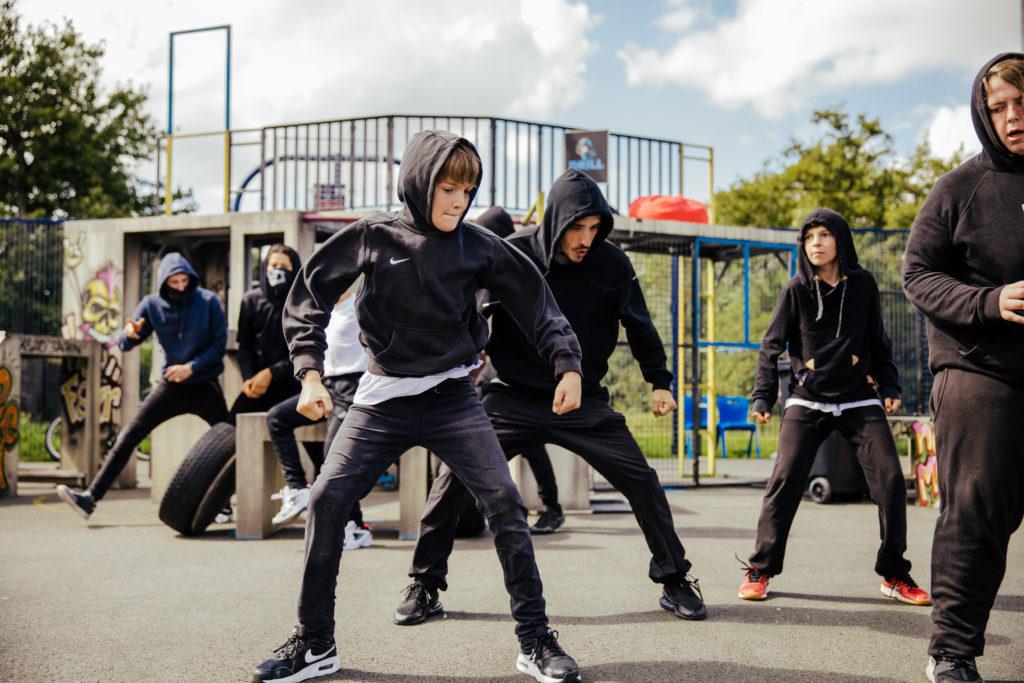Performing arts have long been a powerful way to inspire, transport, and empower young people. From theatre and drama to music and dance, these mediums offer more than just a creative outlet—they play a crucial role in helping young people build confidence, develop essential life skills, and navigate the challenges they face.
At Justice in Motion, we have seen first-hand how our productions have transformative power. Our current production CODE, features trials bikes, a unique aspect of the show, alongside physical theatre, rap, parkour, and multimedia, CODE opens up important conversations and empowers young people to reflect on the issues affecting their lives.
The Impact of Performing Arts on Young People
ABC Magazine’s recent article, Unleashing Potential: The Transformative Power of Performing Arts Classes for Children, explores how arts education helps young people build confidence, handle challenges, and express themselves. Through our work, we have seen the lasting impact of performance-based learning. With our CODE production, 60% of students found that combining performance with information helped them engage with important topics, making the learning experience feel relevant and engaging. Participation in such activities encourages students to step outside their comfort zones, learn from feedback, and develop skills that support their well-being and learning.
Similarly, Vital Arts’ article The Power of Performing Arts looks at how music, theatre, and dance help students learn how to critically think, work well with others, and adapt to different situations. They found that music encourages teamwork and problem-solving, as students collaborate in groups like bands or orchestras, listening to one another and blending their sounds. Virtual Arts also saw how theatre helps students be more creative in expression and be a part of live performances by working together to bring a production to life. Meanwhile, they found that dance, helps to promote creativity through movement. These art forms, together, help students build essential skills that support both their artistic and everyday lives.
International Perspectives: Arts Education and Crime Rates
When we look at arts education provisions across different countries, we can see notable differences. In France, arts education is deeply rooted in the national curriculum, with a strong emphasis on cultural education from an early age. In 2022, the French Ministries of Justice and Culture signed a five-year protocol focused on:
- Creating spaces for cultural activities in prisons
- Training prison staff, external workers, and prisoners for reintegration
- Offering high-quality artistic and cultural activities to people in custody
Inside the facilities, coordinators work with prison staff and teachers. The cultural policy involves many partners—local authorities, museums, libraries, artist networks, and theater companies. The Vis-à-Vis festival, led by the Paris Villette theater, allows prisoners to create and perform shows with directors or choreographers.The Vis-à-Vis festival initiative began in Île-de-France, rolled out in Provence-Alpes-Côte d’Azur in 2023, and will expand to other regions starting in 2026. Artistic and cultural activities help make detention a time to prepare for release and reduce reoffending. They build skills, self-esteem, communication, and peaceful relationships. In Marseille, the Lieux Fictitious association trains prisoners in visual arts at Baumettes prison. At Saint-Maur and Fresnes prisons, sound training and recording studios have been developed by Les Musiques de la Boulangère and La Lucarne d’Ariane, in partnership with INA.
In Australia, the Youth Crime Prevention and Early Intervention Project (YCPEIP) was launched in 2021 and focuses on providing diversion programmes for young, first-time offenders to help reduce their involvement with the criminal justice system. The programme has shown a significant reduction in reoffending rates, dropping from 54.7% to 30.5% in areas like Brimbank and Wyndham (The Australian, 2023).
The YCPEIP emphasises creativity and community-based programmes, using arts-based activities to foster positive engagement and reduce criminal behaviour. By offering alternative pathways and mentoring support, the initiative provides young people with opportunities to build skills and connections that help them avoid future involvement in crime.
In the United Kingdom, arts education has often faced challenges, especially when it comes to maintaining funding and support for the arts in schools. This ultimately leads to disparities in access and quality. The OECD’s “Education at a Glance 2024” report highlights such issues, noting that inequalities in education often start early and can persist throughout a young person educational journey and beyond. For more insights on this topic, check out the Journal of Youth Studies article, “Marginalised Youth, Criminal Justice, and Performing Arts: Young People’s Experiences of Music-Making.“

Image credit: OECD, 2024
In South America, countries like Brazil have made great steps in getting arts into education, recognising its role in social development and crime prevention. Initiatives such as the “Projeto Guri” in São Paulo offer music education to thousands of children, aiming to provide alternatives to gang involvement and reduce crime rates. Studies have shown that participation in such programmes correlates with lower rates of young people being involved in criminal activities (UNESCO, 2024).
Crime Rates and the Role of Arts Education
In the United Kingdom, studies have shown that arts interventions can lead to a reduction in reoffending rates among young offenders. This can be seen in the study by Ingeus which looks at using art interventions on young offendors. The young people who took part in the study said they gained a sense of pride and motivation, with some stating they felt ‘a sense of achievement,’ ‘buzzing—remembered how much I love/loved making music,’ and ‘inspired to write again.'”
In Brazil, the “Projeto Guri” initiative has been linked to a decrease in juvenile crime rates. Research shows that participation in music education programmes like “Projeto Guri” is associated with lower rates of young people’s involvement in criminal activities. The study found that arts involvement positively impacts academic outcomes primarily for at-risk young people from low socioeconomic backgrounds. However, it also noted that arts engagement promotes civic participation in both high- and low-SES groups. Young people from socially and economically advantaged backgrounds can benefit from greater social and civic involvement through deep arts experiences.

Image credit: Igneus
Justice in Motion’s Approach: Integrating Arts and Social Issues.
We believe that arts education and creative expression play a crucial role in addressing social issues and empowering young people. Our CODE production is designed to be fun, engaging, and thought-provoking, offering excitement and surprise while highlighting the real challenges that affect our society.
For CODE, we work within communities and schools, providing workshops, that allow young people to explore the themes of the show in a creative way, and learn skills in parkour, physical theatre, movement, rap, and ensemble work. The residencies focus on important social issues, including child exploitation, giving young people a chance to express themselves creatively and raise awareness about the challenges they face. We also provide community activities like mobile parkour parks, skateboarding sessions, and a mobile skate park to engage even more people alongside our shows.
This year, we are raising £10,000 through the Arts for Impact Campaign to get the education programme that we provide alongside CODE, to get into more schools – as we are touring the production this summer so that we can reach more young people. For every £1 donated, your donation will be doubled by Arts for Impact, who will be matching donations up to £5,000. CODE not only raised awareness on county lines and knife crime. It empowers young people by educating them on how gangs operate, the tricks they use to target vulnerable young people, and the signs to watch out for in themselves or their peers. We also explain the law in a clear and accessible way, giving them the knowledge to protect themselves and make informed decisions if they ever find themselves in a difficult situation.

While the effectiveness of arts education can vary depending on cultural and societal contexts, research shows that providing creative outlets for young people can continue to empower them. Artistic programmes give young people the opportunity to express themselves, build confidence, and develop essential life skills. At Justice in Motion, we continue to educate the young people we work with through our productions which gives them the knowledge and confident to have important conversations.
We are committed to using the arts to educate, inspire, and create lasting impact. With your support, we can continue this vital work and reach even more young people, helping them make better choices and shape their futures.